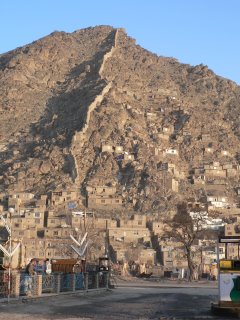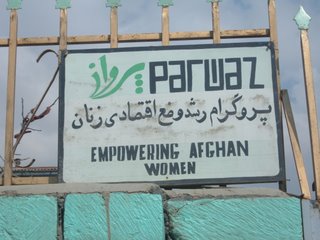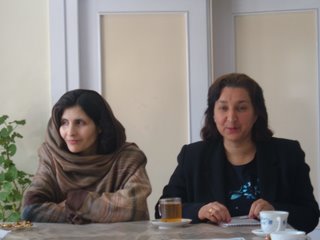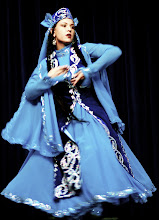 Above pic:
Above pic: A view in the city...
 Below pic:
Below pic: Two of the staff at PARWAZ...
 As soon as my head hit the pillow at 8:30 Sunday night, I slept straight until 6:00 AM Monday morning. I continued to rest, cuddled under my fuzzy blankets, until breakfast was served inside at 7:00. Awaiting us was a spread of fresh bread (nan), honey, black cherry jam, 'happy cow' cheese, and green and black chai.
As soon as my head hit the pillow at 8:30 Sunday night, I slept straight until 6:00 AM Monday morning. I continued to rest, cuddled under my fuzzy blankets, until breakfast was served inside at 7:00. Awaiting us was a spread of fresh bread (nan), honey, black cherry jam, 'happy cow' cheese, and green and black chai.
If I am endowed with one cultural marker as a Seattleite, it is my addiction to coffee - and not just any coffee, but quality, strong, dark roasted coffee (preferably fair trade, of course!) I had a strong sense beforehand that Nescafe Instant coffee was what would be available for us at the guesthouse, and thus the 'emergency/luxury' item I allowed myself to bring was a Ziplock bag of my own ground coffee and a travel mini-french press. Fortunately I had packed my coffee 'emergency pack' in my carry-on backpack - so even though I didn't have a change of clothes (since my luggage had not arrived), I at least had my coffee and as far as I was concerned, that was all I needed!! Recovering from jetlag would have been far more difficult without it. If there is one memory that the other delegation participants and those working at the guesthouse have of me, I would be willing to guess that it is an image of me in the mornings, groggy-eyed with mini-french press in hand, imbibing my strong brew as if it were life itself!
In time, we all piled into the vans and head out into the city to meet with our first organization - PARWAZ.
PARWAZ, a Dari word meaning 'to rise' or 'to fly', is the first women-led grassroots microfinance institution established in 2003 in Afghanistan by Afghans for Afghans. PARWAZ provides financial services in the form of credit and savings to disadvantaged and poor women to start micro-businesses (tailors, carpets, hair salons, agriculture, etc.) PARWAZ is based on the belief that women's long-term success in society is dependent upon self-reliance and economic empowerment. If you would like more information about PARWAZ, please visit their website at
www.parwaz.org.
Our first visit with PARWAZ was a fine first example of the visits with organizations we would meet during our time in Kabul. Our vans parked outside the building that housed PARWAZ and Najib knocked on the tall white gate. A male guard opened the gate for us and led us inside. A warm, slightly mild-mannered yet very professional woman named Zamina greeted us and led us into a comfortable conference room where we all sat at a large enough table to accommodate our entire delegation of twelve, as well as Najib, Naqibullah, Zamina and Roya (pictured above) of PARWAZ. After a hospitable serving of chai and pastries, Zamina and Roya introduced themselves and the organization, both of them very adept at speaking English. After their introductions, we had the opportunity to ask our own questions. The majority of what we learned can be found at the above website (so as not to be redundant, as well as save myself from extra typing :). One of the delegation members inquired if it was common for the husbands of the women starting their own businesses and receiving loans from PARWAZ to object or oppose to their wives working outside of the home. Zamina and Roya explained that some of the women are still choosing to run their businesses out of their homes (while some are not) for various reasons such as reducing business costs (not having to rent retail space) and for the convenience of caring for family, children, etc. But for the women who have chosen to run businesses outside of the home, Zamina and Roya said that they have yet to hear of an opposition from the husbands. My own personal speculations in regards to this matter (though based off of very little experience) is this: Many in the West have yet another erroneous image of Afghan women and/or Muslim women as being completely locked up in their homes under the domination of their husbands. While women were lawfully prohibited from leaving their homes without a male relative during the Taliban regime, and while it may be the case for a certain percentage of women to face opposition from their husbands, I had a sense that due to the economic strife that Afghanistan faces today, a good majority of men and women have a sense of what is necessary to support themselves and their families - women starting their own businesses and working outside of the home as being one of them. Another inquiry was in regards to who was employed at PAWAZ itself. According to Zamina and Roya, there are 28 women working at PARWAZ and one male guard, one male driver and one male manager (very matriarchal!)....
 As soon as my head hit the pillow at 8:30 Sunday night, I slept straight until 6:00 AM Monday morning. I continued to rest, cuddled under my fuzzy blankets, until breakfast was served inside at 7:00. Awaiting us was a spread of fresh bread (nan), honey, black cherry jam, 'happy cow' cheese, and green and black chai.
As soon as my head hit the pillow at 8:30 Sunday night, I slept straight until 6:00 AM Monday morning. I continued to rest, cuddled under my fuzzy blankets, until breakfast was served inside at 7:00. Awaiting us was a spread of fresh bread (nan), honey, black cherry jam, 'happy cow' cheese, and green and black chai.



<< Home